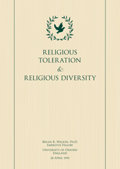What now follows is an inventory of items that are probably to be discerned in any movement, organization or system of teachings which might count as a religion. Not all of these items will usually be found in any given case, and one might decide what proportion of them would need to be present for a particular set of beliefs and practices to qualify for religious status. Given the very long span of human history over which religions have come into being, the inventory inevitably reflects diverse tendencies which reflect different degrees of sophistication in religious ideas, from, at the one extreme, highly specific quasi-magical orientations to, at the other end of the spectrum, relatively abstract, reified, or, as might be said, ethereal conceptions of major religious concerns and entities. In the nature of the case, and even allowing for internal diversity and divergent degrees of sophistication among its devotees, no one religion is likely to embrace both these types of orientation in equal measure, if at all. Hence, it must be apparent that no one religion is likely to qualify as such by achieving a one hundred per cent affirmation of all the items of the probabilistic inventory. The probable features of a religion are as follows:
(1) belief in an agency (or agencies) which transcend(s) normal sense perception and which may even include an entire postulated spiritual order of being;
(2) belief that such an agency not only affects the natural world and the social order, but operates directly upon it and may have created it;
(3) the belief that at some times in the past explicit supernatural intervention in human affairs has occurred;
(4) belief that supernatural agencies have superintended human history and destiny: when these agencies are anthropomorphically depicted they are usually credited with definite purposes;
(5) the belief is maintained that man’s fortune in this life and in afterlife (or lives) depends on relationships established with, or in accordance with, these transcendental agencies;
(6) it may (but not invariably) be believed that whilst transcendent agencies may arbitrarily dictate an individual’s destiny, the individual may, by behaving in prescribed ways, influence his experience either in this life or in future life (or lives) or both;
(7) there are prescribed actions for individual, collective, or representative performances—namely, rituals;
(8) there are elements of placatory action by which individuals or groups may supplicate for special assistance from supernatural sources;
(9) expressions of praise, devotion, gratitude, obeisance or obedience are offered by, or in some cases, required of believers, usually in the presence of symbolic representations of the supernatural agency(ies) of the faith; such manifestations of attitude constitute worship;
(10) language, objects, places, edifices, and seasons that are particularly identified with the supernatural become sacralized and may themselves become objects of reverence;
(11) there are regular performances of ritual or exposition, expressions of devotion, celebration, fasting, collective penance, pilgrimage, and reenactments or commemorations or episodes in the earthly life of deities, prophets, or great teachers;
(12) occasions of worship and exposition of teachings produce for adherents a sense of community and relationships of goodwill, fellowship, and common identity;
(13) moral rules are often enjoined upon believers, although the areas of their concern varies: they may be couched in legalistic and ritualistic terms, or they may be canvassed more as conformity with the spirit of a less specific, higher ethic;
(14) seriousness of purpose, sustained commitment, and lifelong devotion are normative requirements;
(15) according to their performance, believers accumulate merit or demerit to which a moral economy of reward and punishment is attached. The precise nexus between action and consequence varies from automatic effects from given causes to the belief that personal demerit may be cancelled by devotional and ritual acts, by confession and repentance, or by special intercession from supernatural agents;
(16) there is usually a special class of religious functionaries who serve as custodians of sacred objects, scriptures, and places; specialists in doctrine, ritual and pastoral guidance;
(17) such specialists are usually paid for their services, whether by tribute, reward for specific functions, or by instituted stipend;
(18) when specialists devote themselves to the systematization of doctrine, the claim is regularly made that religious knowledge provides solutions for all problems, and explains the meaning and purpose of life, often including purported explanations of the origin and operation of the physical universe and of human psychology;
(19) legitimacy is claimed for religious knowledge and institutions by reference to revelation and tradition: innovation is regularly justified as restoration; and
(20) claims to the truth of teaching and efficacy of ritual are not subjected to empirical test, since goals are ultimately transcendent and faith is demanded both for goals and for the arbitrary means recommended for their attainment.





























